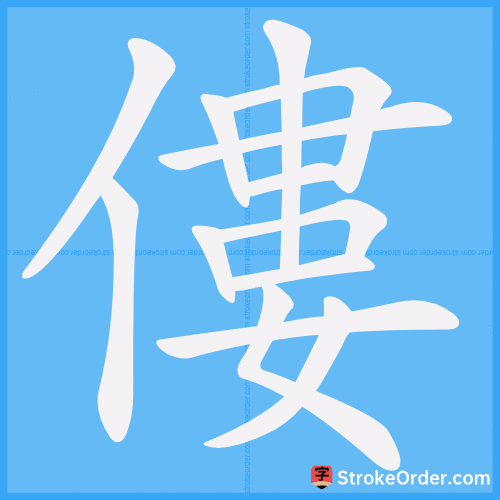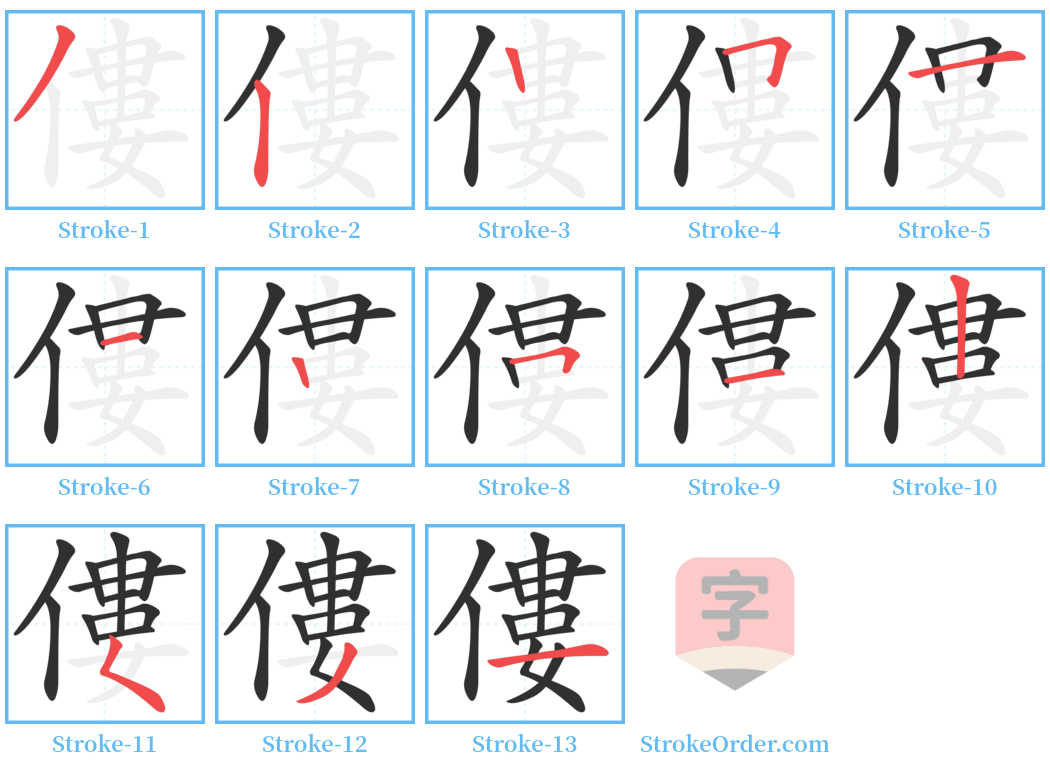僂 Stroke Order
Animated Stroke Order of 僂

Stroke Order Diagrams for 僂

Step-by-Step Handwriting Guide for 僂

Learn to Write Chinese Characters with Video Tutorials
Watch the video of writing the Chinese character "僂", learn the correct stroke order (笔顺) of the character "僂", and master the standard way of writing the character "僂".
Free Printable Handwriting Practice with Stroke Order: 僂
Printable Writing Practice Worksheet of "僂" in Portrait Orientation (Tian Zi Ge)

Printable Writing Practice Worksheet of "僂" in Landscape Orientation (Tian Zi Ge)

Information of 僂
Pinyin
lǚ、 lóu
Radical
亻
Strokes
13 strokes
Usage
★★★
Definition
hunchback
僂 [lǚ]
1. Bend; curve.
2. Swift; immediate.
1. Bend; curve. Classical reference: "Thus the inscription on the tripod says: one command leads to bending, two commands lead to stooping, three commands lead to lowering." (Zuo Zhuan, Year 7 of Duke Zhao)
2. Swift; immediate. Classical reference: "Those jewels are not to be worn, not to be eaten, nor can they be sold immediately." (Xunzi, The Righteousness of Confucianism)
僂 [lǚ] (Verb)
- Primary Meaning: Bend over.
- Word Formation: Phonetic-semantic compound; combines "person" with the phonetic "lǚ."
1. Same as primary meaning (bend).
2. Generally refers to bending.
引:
1. "Shuo Wen":僂 means to bend. According to "Bai Hu Tong": The Duke of Zhou had a bent back, indicating he was honorable. This character originally refers to bending or stooping.
2. "Li Ji, Wen Sang": Those who are bent do not bare their chests.
3. "Zhuangzi, Da Sheng": Saw those afflicted with bends.
4. "Han Shu, Cai Yi Chuan": Walking with a bent body.
5. "Zuo Zhuan, Year 7 of Duke Zhao": Bending after two commands.
6. "Xunzi, Wang Zhi": Bend, limping diviner.
7. "Zhuangzi, Lie Yu Kou": Zheng Kao, after one command bends (curved back), after two commands bends (stoops), after three commands lowers (bending body).
8. "Hou Han Shu, Deng Hou Chuan": Among those accompanying, one bends low as if from humility.
Example: Again如: bend back (bowed back); bend (bent appearance, indicating submission); walk while bent (hunched over); bent steps (walking with a hunch); bent person (hunchbacked, referring to the elderly); bending body (stooping down); bending low (stooping as a gesture of respect).
2. Generally refers to bending.
引:
1. "Xunzi, Ru Xiao": Even with the wisdom of a sage, still cannot bend the finger.
僂 [lǚ] (Noun)
- A hunchbacked person (English: crooked).
引:
1. Ouyang Xiu's "Record of the Drunken Old Man Pavilion": The crookedly bent elder who comes and goes without ceasing refers to the people of Chuzhou.
2. "Gu Liang Zhuan": The strong lead the strong, the frail lead the frail, the lame lead the lame, the crooked lead the crooked.
僂 [lǚ] (Adjective)
1. Swift; fast (English: speedy).
引:
1. "Gong Yang Zhuan": If a person does not hurry, one cannot make them enter.
2. Also see : lóu
1. Refer to "佝僂病" (gōulóubìng) and "僂儸" (lǚluó).
僂
1. 僂 lóu
2. Refer to "佝僂" (gōulóu)
3. Also see: lǚ